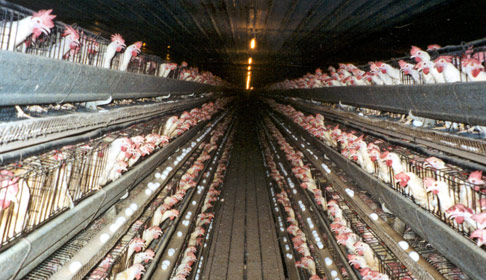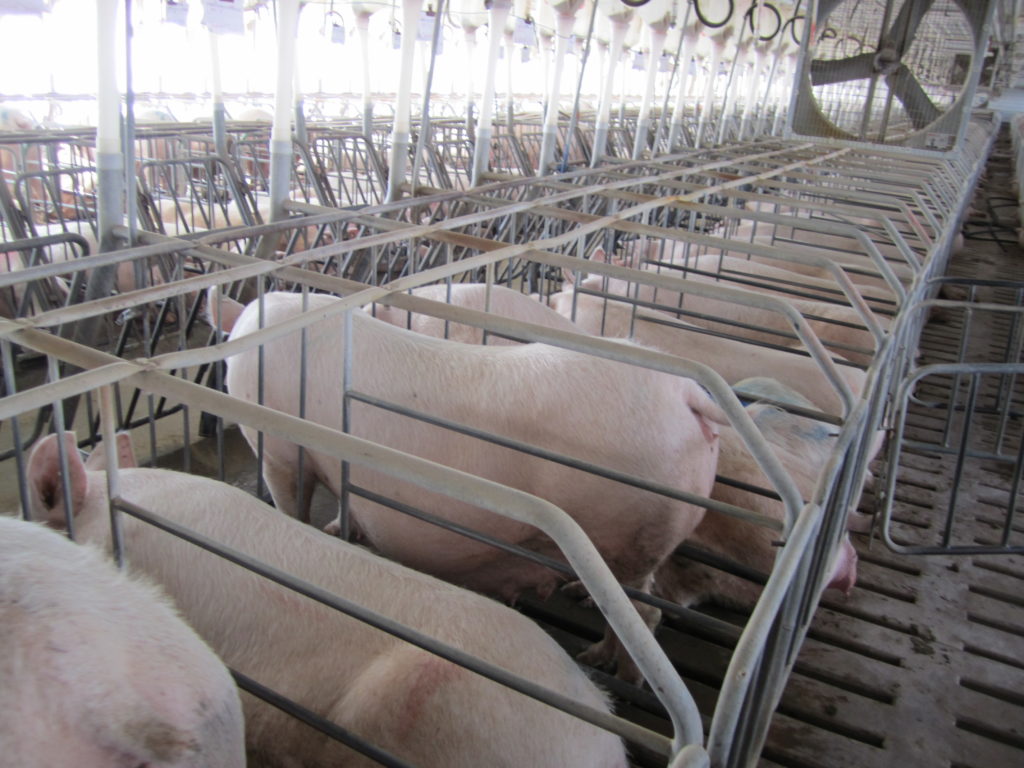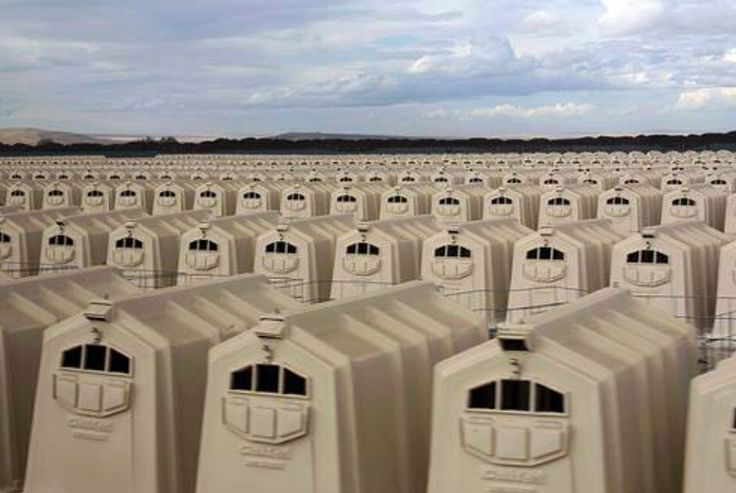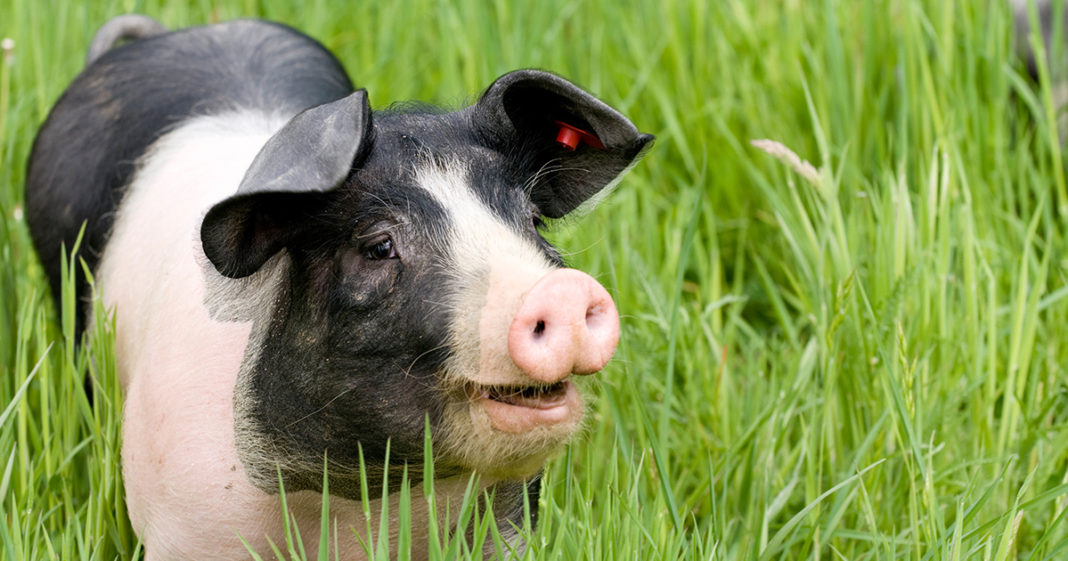On Tuesday, November 8th, Massachusetts voters will have the opportunity to make the state a national leader in compassionate animal husbandry. The “Prevention of Farm Animal Cruelty Act” would “prohibit breeding pigs, calves raised for veal, and egg-laying hens from being held in confined spaces. Question 3 defines confined as meaning that which “prevents the animal from lying down, standing up, fully extending its limbs, or turning around freely.” The law would not only prohibit these inhumane practices in Massachusetts, but would also prevent retailers from selling products produced using these methods that come from out of state.
There are three types of animals that are protected by this proposal- chickens, pigs, and young calves. Cage-free eggs are the first and foremost thing on everyone’s minds. But, the new law also gives dignity to pregnant sows and young calves. What types of cages and agricultural practices does Question 3 involve? Here’s the breakdown…

Battery Cages (Chickens)
A “battery cage” is a cage that is about the size of an iPad in which a chicken cannot fully stand, spread its wings, or turn around. In 1999, the European Union voted to ban battery cages with a 12 year phase-out coming into effect in 2012. There is only one farm in Massachusetts that uses battery cages, Diemand Farm in Wendell; however, 90% of the eggs sold in the United States supermarkets and restaurants still come from chickens confined to battery cages. From McDonald’s to Walmart, companies are moving towards cage-free eggs. Cage-free is not the end-all of goodness, cage-free chickens most often don’t even go outside and are still in confined conditions, but it’s a start. To learn more about what egg labels mean, you can read the full article I previously wrote, ‘Eggucation: Understanding What “Cage Free” & Other Egg Labels Really Mean’.

Gestation Crates (Pigs)
The current practice for a pregnant sow is to keep her confined to a “gestation crate” for the full term of her pregnancy, and sometimes her entire adult life. A gestation crate is two feet wide, giving the sow no opportunity to even turn around or in any other way have a normal life. Gestation crates have concrete slatted floors to allow waste to fall down. Gestation crates are already banned in the EU, Canada and nine states in US.

Veal Crates (Calves)
Calves raised for veal are kept in veal crates that are generally between 2.1-2.5 feet wide. Veal crates are designed to limit movement, and the young calves often have restricted views and cannot see one another. In a natural environment, a calve would suckle from the mother three to six times a day for a period of up five months. Calves raised for veal have short lives that are deprived of any social interaction or movement. The calves only know a short dark life with nothing but discomfort and fear. Veal crates were outlawed in the EU as of 2007, and veal production is completely banned in many northern European countries including Finland.
Why It Matters
The Act proposed by Question 3 has many thoughtful exceptions to give farmers the practical tools they need to get the job done. Some of these exceptions deal with transportation, fair exhibitions, veterinary exams, treatment after a medical procedure, allowing a sow to be confined for up to five days before her expected birth date (farrowing crates are used, in which the sow can lie down), medical research, and during slaughter. The proposal would also exclude sales that combine veal and pork with other products such as soups, pizzas, hotdogs, and similar types of processed and prepared foods.
Whether you are a meat eater, a vegetarian, or a vegan, all should agree that there can be a basic concept of compassionate treatment of the animals that share our world. Being able to spread wings, turn around, and to see light and other creatures gives life dignity before it becomes a meal on the table.
Supporters of Question 3 include the MSPCA, United Farm Workers, Citizens for Farm Animal Protection, Massachusetts Family Farms, ASPCA, Sierra Club, Animal Rescue League of Boston, The Humane Society of the United States, Center for Food Safety, Zoo New England, Humane League, Mercy for Animals, Compassion over Killing, Farm Forward, Compassion in World Farming, Animal Equality, Farm Sanctuary, Consumer Federation of America because confinement increases food safety risks, and 400 Massachusetts veterinarians.
Opponents Argument
There are two sides to every issue and Question 3 is no exception. Opponents argue that there are already options for consumers who want animal products raised in humane conditions. Opponents also include food poverty advocates that argue that a “Yes” vote on 3 will bring higher food prices. A recent Cornell University study is sited by opponents that estimates that consumers could spend an additional $70 a year on eggs for a household of five, a number hotly contested by supporters.
Opponents include the National Pork Producers Council, the New England Brown Egg Council, the Massachusetts Farm Bureau, and the Retailers Association of Massachusetts.

Vote Yes on 3
There is little argument that humane conditions for animals can result in products with higher prices than those products produced using uncompassionate practices. Cheap food has a high cost, both for our health and in steering our moral compass in the wrong direction. The Prevention of Farm Animal Cruelty Act creates a model for other states, and our nation as a whole, to use in order to create a kinder and more compassionate system of animal husbandry. When humane systems are scaled out, prices will come down.
Over 60% of Massachusetts voters support Question 3 in recent polls. Proudly, I am a supporter. As a animal rights advocate who has also volunteered with Project Bread to help eliminate food poverty in Massachusetts, I also understand the hardships of being on a low food budget. In America we spend less of a percentage of our income on food that any other country in the world. It is time that we vote in the booth, as well as with our wallets, to support products that represent who we are- a people who believe in dignity for all the creatures that we share this world with.
This election season has been a fractious one to say the least. Regardless of where you stand on who to vote for this year, I hope that all Massachusetts residents will join me in voting “Yes on 3” to support compassionate farming practices and beginning the end of cruelty to farm animals.
Voter Resources:
Register to Vote for Massachusetts Residents (Oct 19th Deadline)




